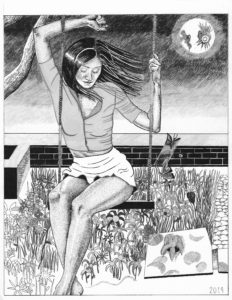 I’ve been especially troubled lately by the “manic” in manic-depression, classified as mania, or hypomania. Mania is the flip side of a coin whose other face is depression. I’ve already discussed MY experience of depression (for we are all different, and feel these things in our own way.) Without a doubt, depression is unpleasant. Mania is far more deceptive. When I feel the approach of a manic episode, colors become more vibrant, smells more intense and generally more pleasant, and my sense of taste can make a chocolate chip cookie seem like a doorway to infinite orgasmic pleasure.
I’ve been especially troubled lately by the “manic” in manic-depression, classified as mania, or hypomania. Mania is the flip side of a coin whose other face is depression. I’ve already discussed MY experience of depression (for we are all different, and feel these things in our own way.) Without a doubt, depression is unpleasant. Mania is far more deceptive. When I feel the approach of a manic episode, colors become more vibrant, smells more intense and generally more pleasant, and my sense of taste can make a chocolate chip cookie seem like a doorway to infinite orgasmic pleasure.
The experience is much more than sensual, however. Things just seem to fall into place perfectly: every sentence I utter is on target and filled with wit or wisdom, my movements are more graceful, my cognition crystalline in essence, and my creativity very nearly limitless. In fact, where creativity is concerned, the good ideas come more frequently as the mania approaches its peak, necessitating hastily jotted notes while I’m working on something unrelated. It feels good, very good.
Mania, for me, usually means sleeplessness, which is absolutely fine, because there is so much I want to get done. One night of insomnia is a small price to pay for such clarity of thought. Lately, however, my manic episodes have been averaging two to three nights. There are catnaps, to be sure, but they become decreasingly refreshing by day two, and sometimes, go away altogether. And all those great ideas morph gradually into rapidly cycling thoughts, paired with uncanny forgetfulness. Then come the thought loops, an obsessive treading and retreading of the same ideas, accompanied by pathological worrying. I become paranoid, convinced that someone’s lack of response signifies that he/she is angry with me. My hands start to shake, the light in the room sears my retinas, and my favorite music is suddenly discordant and anxiety-inducing.
If, beyond this point, I haven’t yet begun to cycle back, I encounter what the DSM-5 (Diagnostic Statistical Manual of Mental Disorders) calls “derealization,” a sense that the world I’m inhabiting does not actually exist. Next come little whispers and stray sentences, most quite convincing, often forcing me to seek out their sources. When I inevitably fail to find the speaker, I return to my worry-loops, and occasionally see movement in my peripheral vision.
At times, these episodes become severe enough that I need to double my intake of my anti-psychotic medication. Then, finally, begins the journey back towards “normal” and from there to depression. It’s the circle of life, at least my life….
